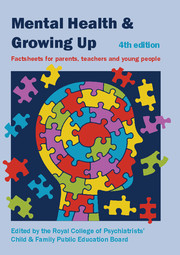Book contents
- Frontmatter
- Contents
- Contributors
- Factsheets for young people
- Factsheets for parents, carers and anyone who works with young people
- 1 Good parenting
- 2 The restless and excitable child
- 3 Dealing with tantrums
- 4 Children who soil or wet themselves
- 5 Sleep problems in childhood and adolescence
- 6 Behavioural problems and conduct disorder
- 7 Attention-deficit hyperactivity disorder (ADHD)
- 8 The child with general learning disability
- 9 Specific learning difficulties
- 10 Autism and Asperger syndrome
- 11 Depression in children
- 12 Worries and anxieties: helping children to cope
- 13 Divorce or separation of parents: the impact on children and adolescents
- 14 Death in the family: helping children to cope
- 15 The emotional cost of bullying
- 16 Traumatic stress in children
- 17 Domestic violence: its effects on children
- 18 Child abuse and neglect: the emotional effect
- 19 Drugs and alcohol: what parents need to know
- 20 Self-harm in young people
- 21 Psychosis
- 22 Schizophrenia
- 23 Bipolar disorder in children and adolescents
- 24 Obsessive–compulsive disorder in children and young people
- 25 Eating disorders in young people
- 26 Chronic physical illness: the effects on mental health
- 27 Medically unexplained physical symptoms
- 28 Chronic fatigue syndrome: helping your child get better
- 29 Parental mental illness: the problems for children
- 30 Who's who in CAMHS
9 - Specific learning difficulties
from Factsheets for parents, carers and anyone who works with young people
Published online by Cambridge University Press: 02 January 2018
- Frontmatter
- Contents
- Contributors
- Factsheets for young people
- Factsheets for parents, carers and anyone who works with young people
- 1 Good parenting
- 2 The restless and excitable child
- 3 Dealing with tantrums
- 4 Children who soil or wet themselves
- 5 Sleep problems in childhood and adolescence
- 6 Behavioural problems and conduct disorder
- 7 Attention-deficit hyperactivity disorder (ADHD)
- 8 The child with general learning disability
- 9 Specific learning difficulties
- 10 Autism and Asperger syndrome
- 11 Depression in children
- 12 Worries and anxieties: helping children to cope
- 13 Divorce or separation of parents: the impact on children and adolescents
- 14 Death in the family: helping children to cope
- 15 The emotional cost of bullying
- 16 Traumatic stress in children
- 17 Domestic violence: its effects on children
- 18 Child abuse and neglect: the emotional effect
- 19 Drugs and alcohol: what parents need to know
- 20 Self-harm in young people
- 21 Psychosis
- 22 Schizophrenia
- 23 Bipolar disorder in children and adolescents
- 24 Obsessive–compulsive disorder in children and young people
- 25 Eating disorders in young people
- 26 Chronic physical illness: the effects on mental health
- 27 Medically unexplained physical symptoms
- 28 Chronic fatigue syndrome: helping your child get better
- 29 Parental mental illness: the problems for children
- 30 Who's who in CAMHS
Summary
What effect does it have?
Specific learning difficulties can make lessons challenging for a child. They may struggle keeping up with classmates, and may come to see themselves as stupid or no good.
If the child finds it difficult to concentrate on lessons, because they may not be able to follow them properly, they may complain of lessons being ‘boring’ and search for other ways to pass the time and to succeed.
They may try to avoid doing schoolwork because they find it impossible to do it well. Doing badly in school can undermine their self-confidence, and this can make it harder for them to get along with other children and to keep friends.
Children with specific reading difficulties often become angry and frustrated, so behavioural problems are common. If they don't get suitable help, the problems may get worse. Older children may become frustrated, fail exams or get into serious trouble, both at school and outside.
A specific learning difficulty is not a mental illness. However, children with a specific learning difficulty are more likely than other children to develop mental health problems, for example anxiety, or have additional developmental disorders, such as autism spectrum disorder and attention-deficit hyperactivity disorder (ADHD).
What can help?
Identifying the problem is the most important step to get the right help and support. Usually the difficulties are first picked up by the family or school.
Parents can discuss their concerns with the teacher or special educational needs coordinating officer (SENCO). Education authorities have a duty to identify children who have special educational needs and make sure that they get the additional help that they require (Education Act 1990). Schools have the Special Educational Needs Code of Practice, drawn up by the Department for Education, to help them to recognise and assist children with this type of problem. The Department for Education has also produced a guide for parents and carers.
If there are concerns, the school may offer extra help using different ways of teaching to suit the child's specific needs (called individual education plan or IEP). If this is not enough, then they can offer interventions that are additional to, or different from, those provided as part of the school's usual curriculum and strategies (School Action and School Action Plus).
- Type
- Chapter
- Information
- Mental Health and Growing UpFactsheets for Parents, Teachers and Young People, pp. 72 - 73Publisher: Royal College of PsychiatristsPrint publication year: 2013



